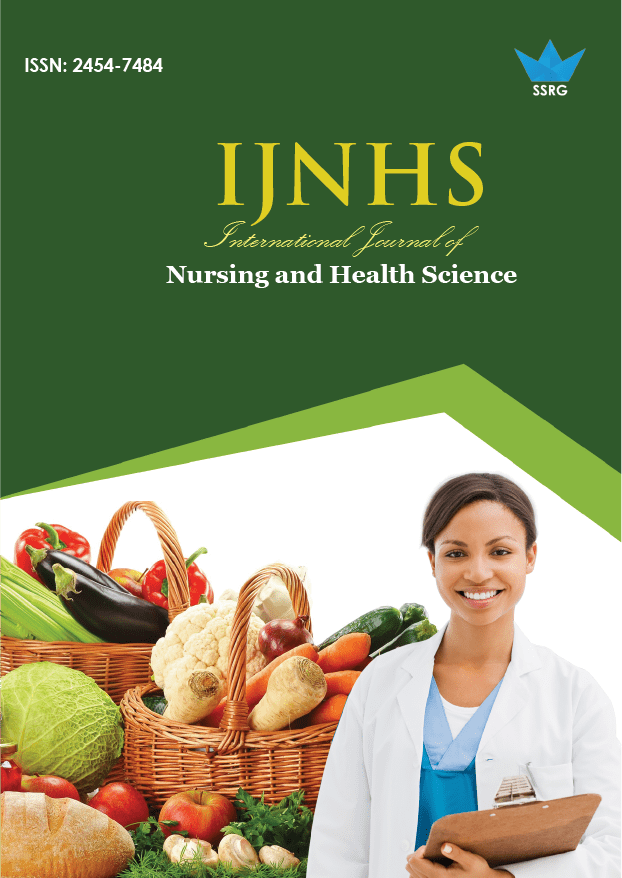Exploring Nurses' Preparedness Toward Disaster Management

| International Journal of Nursing and Health Science |
| © 2020 by SSRG - IJNHS Journal |
| Volume 6 Issue 3 |
| Year of Publication : 2020 |
| Authors : Sarah Saad Alotaibi, Hessa Al mutairi, Fatimah Al Theyab, Ohud Al Otaibi |
How to Cite?
Sarah Saad Alotaibi, Hessa Al mutairi, Fatimah Al Theyab, Ohud Al Otaibi, "Exploring Nurses' Preparedness Toward Disaster Management," SSRG International Journal of Nursing and Health Science, vol. 6, no. 3, pp. 32-35, 2020. Crossref, https://doi.org/10.14445/24547484/IJNHS-V6I3P106
Abstract:
Disaster can be defined as any event that can damage society and cause casualties, deterioration in economic status, and health services. Natural or human-made disasters can significantly affect the physical, mental, and emotional health status of affected people. Nurses are the largest workforce in the health institutes and having a critical role in managing disasters. Therefore, nurses have to be ready at any time to manage these events effectively without any delay. This study explores nurses' perceptions regarding their knowledge, skills, and preparedness for disaster management in Riyadh Region hospitals. A cross-sectional descriptive study was conducted for hospitals under the management of the general directorate of the Riyadh region's health affairs among 260 participants. Data was collected online by Emergency Preparedness Information Questionnaire (EPIQ). The overall emergency preparedness familiarity mean is( 3.4846 ± 1.06), which is a medium level. It is recommended to develop comprehensive training programs to prepare nurses to face any unexpected event, provide care, and meet the needs of affected community members.
Keywords:
Disaster, Nurses, Management, preparedness.
References:
[1] WHO. District health facilities: guidelines for development & operations. Manila: WHO Regional Office for the Western Pacific; (1998) 91.
[2] Powers R, Daily E, editors, International disaster nursing. Cambridge: Cambridge University Press; (2010).
[3] Centers for Disease Control and Prevention (CDC). Emergency preparedness and response. Retrieved from http://emergency. cdc.gov/.(2020).
[4] Pourvakhshoori, S., Khankeh, H. R., & Mohammadi, F., Emergency and disaster preparedness in nurses: A concept analysis, Journal of Holistic Nursing And Midwifery, 27(1) (2017) 35-43.
[5] World Health Organization, Disaster risk management for health fact sheets: Disaster risk management for health: Children health. Global Platform-May, (2011).
[6] Veenema TG. Disaster nursing and emergency preparedness for chemical, biological, and radiological terrorism and other hazards. Springer Publishing, (2012).
[7] Smith, J. S., Disaster knowledge and preparedness affects all nurses: how can nurses prepare, Virginia Nurses Today, 14(10) (2006).
[8] Brunt, B., The role of the emergency preparedness nurse, Ohio Nurses Review, 89(2) (2014)14–15.
[9] Labrague, L. J., Hammad, K., Gloe, D. S., McEnroe‐Petitte, D. M., Fronda, D. C., Obeidat, A. A., & Mirafuentes, E. C., Disaster preparedness among nurses: a systematic review of the literature. International nursing review, 65(1) (2018) 41-53.
[10] 1Chapman, K., & Arbon, P.Are nurses ready?: Disaster preparedness in the acute setting. Australasian Emergency Nursing Journal, 11(3) (2008)135-144.
[11] Daily, E., Padjen, P., & Birnbaum, M.A., Review of competencies developed for disaster healthcare providers: limitations of current processes and applicability, Prehospital and disaster medicine, 25(5) (2010) 387-395.
[12] Al Khalaileh, M. A., Bond, E., & Alasad, J. A., Jordanian nurses' perceptions of their preparedness for disaster management,
International emergency nursing, 20(1) (2012) 14-23.
[13] Hussein, A., & Mahmoud, N., Emergency Preparedness and Perceived Competence in Disaster, Alexandria Scientific Nursing Journal, 18(2) (2016) 1-14.
[14] Martono, M., Satino, S., Nursalam, N., Efendi, F., & Bushy, A., Indonesian nurses' perception of disaster management preparedness, Chinese Journal of traumatology, 22(1) (2019) 41-46.
[15] Tzeng, W. C., Feng, H. P., Cheng, W. T., Lin, C. H., Chiang, L. C., Pai, L., & Lee, C. L., Readiness of hospital nurses for disaster responses in Taiwan: a cross-sectional study., Nurse education today, 47 (2016) 37-42.
[16] Seyedin, H., Dolatabadi, Z. A., & Rajabifard, F., Emergency nurses' requirements for disaster preparedness. Trauma monthly, 20(4) (2015)
[17] Duong, K. Disaster education and training of emergency nurses in South Australia, Australasian Emergency Nursing Journal, 12(3) (2009) 86-92.
[18] Osman, N. N. S., Disaster management: Emergency nursing and medical personnel's knowledge, attitude, and practices of Malaysia's East Coast region hospitals, Australasian emergency nursing journal, 19(4) (2016)203-209.
[19] Ibrahim, F. A. A., Nurses' knowledge, attitudes, practices, and familiarity regarding disaster and emergency preparedness–Saudi Arabia. American Journal of Nursing Science, 3(2) (2014) 18-25.
[20] Nofal, A., Alfayyad, I., Khan, A., Al Aseri, Z., & Abu-Shaheen, A., Knowledge, attitudes, and practices of emergency department staff towards disaster and emergency preparedness at tertiary health care hospital in central Saudi Arabia. Saudi medical journal, 39(11) (2018) 1123.
[21] Al Thobaity, A., Plummer, V., Innes, K., & Copnell, B., Perceptions of knowledge of disaster management among military and civilian nurses in Saudi Arabia, Australasian Emergency Nursing Journal, 18(3) (2015) 156-164.
[22] Garbutt, S. J., Peltier, J. W., & Fitzpatrick, J. J. Evaluation of an instrument to measure nurses' familiarity with emergency preparedness. Military medicine, 173(11) (2008) 1073-1077.

 10.14445/24547484/IJNHS-V6I3P106
10.14445/24547484/IJNHS-V6I3P106